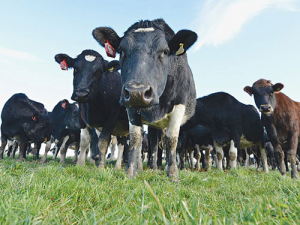North Otago is being treated “like the leper colony of the South Island” over the Mycoplasma bovis outbreak, says Federated Farmers North Otago dairy chairman Lyndon Strang.
Even beef farmers and others with no trace of the disease are being affected, with reports of stock sale contracts being broken and stock buyers looking outside the region.
“I think there is a real stigma, just purely based on our location,” said Strang. “It’s unfair on breeders and other people who have no connection with those affected farms and are running good biosecurity systems.”
Mycoplasma bovis, common overseas, was detected for the first time in New Zealand in mid-July on one Oamaru farm belonging to Van Leeuwen Dairy Group (it owns 16 properties). As of early September, the disease had been confirmed on six properties, most of them VLDG farms but one a lifestyle block near Rangiora which had received animals from a North Otago farm before the Ministry for Primary Industries containment response began.
But Strang said stock movements to and from properties not under MPI movement controls remain safe.
“What’s concerning me most is a lot of scaremongering going on and the unnecessary steps people are taking.”
Strang said he knew of a local dairy farmer who usually sourced 20-30 Jersey mating bulls from a local rearer, but this year had specifically asked his agent to source bulls from outside the area.
“To me, that [seems] a little unfair on those bull rearers; this is how silly it is. It’s our own crew doing it to us too.”
One unidentified beef farmer told Stuff he had a contract for 200 calves to go to a Canterbury operation but the buyer pulled out when he told him his animals were being tested. “That cost me $100,000 -- one conversation, just like that.”
The farmer said his stock were tested because his farm is adjacent to one of the Van Leeuwen farms, although not one considered at risk. About a month ago MPI had tested 130 (about 10%) of his stock and the results had come back negative.
“I was on tenterhooks waiting for those results to come through but we’ve got two more rounds of testing yet and that’s going to be another four weeks.
“But with all the farms coming up positive and all the surrounding farms around them that need testing, I’m picking those four weeks will be stretched out to about six,” the farmer told Stuff.
“That’s a big issue in terms of cashflow, and if I have to hold the calves I was contracted for I’m going to run out of grass and I’ll need more baleage, and it’s going to put me in a more difficult position. The rest of my contracts can’t be fulfilled therefore all my cashflows [will be] down,” he said.
Strang said it would be prudent for buyers to ask for more traceability on animals, but reneging on a contract was a step too far.
“A person you’ve got a contract with should just sit down and go through the history of those animals a bit more: ‘Where did they come from? Can you show not just one owner back, but two previously?’.
“Those are the questions they should be asking, not just cancelling contracts or sourcing their mating bulls from Southland or Canterbury, because there’ll be just as much chance there’ll be an infected farm there, as there is in North Otago.
“[We need to] get the message out there that sourcing stock from North Otago is safe. Farmers who aren’t involved in this are putting good biosecurity measures in place. Purchasers would be prudent to ask for more traceability but I think we have some guys here who are getting affected when they have no connection with it whatsoever.”
Strang said farmers want an independent test to quickly confirm that cattle are not infected, but that is not available at the moment because all testing resources are tied up in the control effort.
However, he was confident the disease is contained.
Nearing the half-way mark
The most recent MPI update revealed that the campaign was nearing the half-way mark, with no further positive results outside the known six properties. MPI expected to do at least 39,000 tests and to date had received 15,788 samples and completed 14,500 tests.
MPI said farm visits, sampling and testing were “progressing well.” MPI was also testing samples from the nationwide surveys and so far no samples from other properties than the ones known to be infected had been positive.
Meanwhile, all calves on the Rangiora lifestyle block had been euthanized and the property remained under movement restrictions. The animals were autopsied by an MPI veterinarian and a large number of samples taken from them.
“These will improve our understanding how Mycoplasma bovis behaves under NZ conditions,” said MPI.
The number of infected places was still expected to increase as animal movements were traced and testing progressed.
However, MPI stressed that all detections to date were linked to the original infected properties via animal movements and had been caused by close animal contact. Despite intensive testing, no adjacent properties had yet been identified as infected.


















